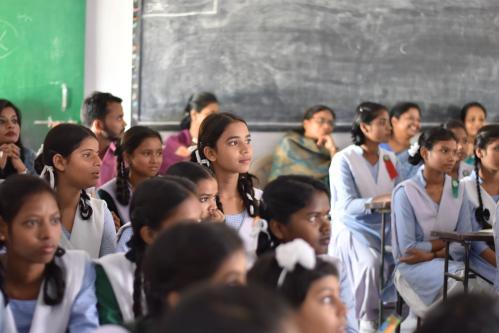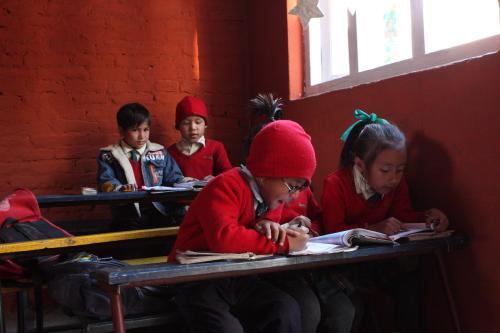The Millions Learning team at the Center for Universal Education is beginning the next phase in its continuation of the Research on Scaling the Impact of Innovations in Education (ROSIE) project as part of the broader Global Partnership for Education’s (GPE) Knowledge and Innovation Exchange (KIX). Here, we share some of what ROSIE previously learned and highlight a few directions for this new ROSIE phase.
What is ROSIE?
To support and better understand how to scale education innovations effectively in low- and middle-income countries (LMICs), in 2020 the Millions Learning project at the Center for Universal Education (CUE) at Brookings joined the Global Partnership for Education’s (GPE) Knowledge and Innovation Exchange (KIX), a joint partnership between GPE and the International Development Research Centre (IDRC), to facilitate a cross-national, multiteam, research and professional support project called ROSIE.
Between 2020 and 2023, ROSIE established a global learning community, conducted an action-research project, led capacity-strengthening sessions for many of the KIX applied scaling research projects, and conducted complementary research on government decisionmaking for scaling education innovations. These intertwined strands of work included collaborative research, virtual and in-person convenings, building a network of peer exchange and scaling support, and developing and disseminating several knowledge products. Many of the tools, materials, and briefs developed during this phase of work can be found on the ROSIE website. Sharing a few top-level highlights now, however, seems worthwhile.
What have we learned so far?
- Engage the right champions early. There are different kinds of scaling champions (we identified six types) and they must be engaged differently (and their engagement maintained over time) at different moments in the scaling journey. Champions, after all, are individuals with their own priorities, networks, and needs—and cannot be approached in a one-size-fits-all manner. Cultivating and engaging different types of scaling champions is not easy. Our recently published research brief, Engaging champions for scaling in education, offers strategies for this Also, our scaling report examined how KIX scaling teams engaged champions.
- Establish early clarity about purposes and terminology. Terms like “scaling impact,” “equity,” “learning,” and “sustainability” mean different things to different people, are often inaccurately linked to past generations of reform, and don’t always translate across languages. Therefore, investing time upfront for open but scaffolded conversations among stakeholders to talk through meanings and broader purposes will increase clarity, shared purpose, and consensus—and can collaboratively calibrate everyone’s expectations.
- If you want to engage government partners, think like a public-sector decisionmaker (and present the right data). Government decisionmaking is only partly straightforward and technical; it is also idiosyncratic, bureaucratic, political, and affected by broader systems. Having a promising innovation and great scaling plan and engaging the right stakeholders doesn’t automatically ensure public-sector adoption and widespread delivery of an initiative. Scaling implementers and researchers use data differently from how government decisionmakers and their advisers do. Our report on decisionmaking contexts and processes in and across low- and middle-income countries (LMICs) discusses ways that funders, practitioners, and others can sharpen and tailor how they approach government policy makers—especially in regard to how data are used to foster understanding and interest.
- Plan for, and thoughtfully balance, the multiple trade-offs that mark any scaling journey. Trade-offs are not scaling ”problems to be solved” but rather ongoing tensions to navigate. They include (a) cost of the scaling versus its depth of impact, (b) speed of scaling versus its sustainability, and (c) the efficiency of the scaling process versus equity considerations as a priority. It is useful to acknowledge and understand the contradictions inherent in trade-offs and to realize that difficult decisions must be made. Knowing that pre-identified trade-offs are coming, learning how others have navigated them before, and finding ways to use data to track the effects of your decision (and perhaps make further changes) are key lessons.
- Be adaptable. If ROSIE has taught us anything, it’s that scaling is not straightforward, solely technical, or the timeline-bound work of project implementation. It is as much an art as a science. It’s often a two-steps-forward, one-step-back kind of advancement and requires ongoing consideration, reflection, and course correction. Our adaptation tracker can help with this. Adaptability is paramount because a scaling effort is tied to the unpredictability of human relationships, governance politics, cultural histories, financial constraints, and unplanned system shocks (such as a pandemic or massive flood). Scaling teams must be focused but flexible, autonomous but participatory, hard-charging but egoless, and able use the right research tools and mindsets to reflect, learn, and pivot with their stakeholders over several years’ time.
What’s next for ROSIE?
Building on these and other learnings—and retooling the ROSIE structure to better meet the needs and expertise of post-pandemic, locally focused GPE KIX teams engaged in cutting-edge scaling and research—the Millions Learning team at CUE is thrilled to begin the next phase of ROSIE. We will work over the next three years with the full cohort of dozens of new (and some continuing) GPE KIX projects to collaboratively generate new insights, exchange knowledge and resources with one another, document and share team successes publicly, and build a lasting learning network of scaling support.
Additionally, we will emphasize how scaling impact can be integrated with systems transformation so that scaling succeeds in part by leveraging the right system levers for holistic systems change that moves whole education locations forward. Scaling can advance systems change at the same time systems change supports scaling success.
We hope that you will follow along with us, share with us your experiences and successes, and stay in touch.
-
Acknowledgements and disclosures
This project is supported by the Global Partnership for Education Knowledge and Innovation Exchange (KIX), a joint partnership between the Global Partnership for Education (GPE) and the International Development Research Centre (IDRC). The views expressed herein do not necessarily represent those of GPE, IDRC or its Board of Governors.
Brookings is committed to quality, independence, and impact in all of its work. Activities supported by its donors reflect this commitment and the analysis and recommendations are solely determined by the scholar.







Commentary
Lessons informing the next phase of Research on Scaling the Impact of Innovations in Education
February 21, 2024